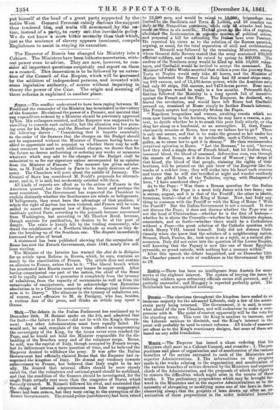Stalq. — The debate in the Italian Parliament has continued up to
December 10th. M. Ratazzi spoke on the 5th, and admitted that the fault—the failure at Rome—did not lie with the King's Govern- ment. Any other Administration must have equally failed. He would not, he said, complain of the terms offered as compromising the sovereignty of the King, for the terms never even reached the Pope, and he would not hold the Minister responsible for the dis- banding of the Bourbon army and of the volunteer corps. Rome, he said, was the capital of Italy, though occupied by French troops, but its deliverance was -a mere question of time, and he believed the Emperor desired to withdraw the army. It was alter the Italian Government had officially claimed Rome that the Emperor had re- cognized the kingdom of Italy. He denied any tendency towards subserviency to France, but believed that Italy ought to be her ally. He desired that internal affairs should be more closely cared for, that the volunteers and national guard should be mobilized, and that the condition of the finances should be investigated, for the single State actually cost more than the congeries of States which formerly existed. M. Ricasoli followed his rival, and contended that the charge of internal ndsgovernmertt was false or exaggerated. :There had been crimes, but they were owing to the corruption of the former Governments. The armed police (carabiueers) had been raised to 13,000 men, and would be raised to 19,000; brigandage was limited to the Basilicata and Terra di Lavoro, and 56 coaches ran daily in the Neapolitan provinces, while only 42 attacks had been made on them in six months. He had given up afe idea of regions, abolished the lieutenancies as separate eentees es/f political action, and prepared' a bill for extending the Italian 'laws over Tuscany. He repeated his views as to the solution of the Roman question, arguing, as usual, for the total separation of civil and ecclesiastical -grower. Ricasoli was followed by the remaining Ministers, among whom General della Rovere stated that the army contained 200,000 efficient soldiers, and would be raised by spring to 300,000. The cadres of the Southern army would be filled, up with 50,000 volun- teers, and Garibaldi would be invited to accept the command. The Minister of Public Works asserted that within a year the journey from Turin to Naples would only take 40 hours, and the Minister of Marine informed the House that Italy had 83 armed ships Carry ing 989 cannon, and of 13,480-horse power, while the Austrian navy had only 80 ships, 703 cannon, and 6473-horse power. Four more Italian frigates would be ready in a few months. Petrucelli della Gattina followed the Ministry in a long speech full of invective against the French and the Pope. The Emperor, he declared, who feared the revolution, and would have left Rome had Garibaldi pressed on, remained at Rome simply to farther French interests. The French sceptre had repeatedly broken the Popes. " Napoleon temporizes and wavers, awaiting events which are even now looming in the horizon, when he may have a reason, a pre- text, to decide whether he is to crush this poor Italy utterly, or else drag her along as a handmaid, as an accomplice. 1.f, then, France obstinately remains at Rome, how can we induce'her to go? There is only one means, and that is to make the ground so hot under her feet at Rome, to render it so intolerable, such a Calvary, such a galley, as to cause her to quit it in dismay." He then recommended perpetual agitation in Rome. "Let the Romans," he said, "beware how they shed a single drop of French blood; but let Italian blood, innocent blood, the blood of unarmed, defenceless men, run through the streets of RAMC, as it does in those of Warsaw ;"the drops of that blood, the blood of that people, claiming the rights of their brethren, will be printed on the pale brow of theEmperor like the marks of a red-hot iron; they will strike into his heart such remorse and terror that he will rise terrified at night and wander restlessly about the gilded halls of the Tuileries, crying, with Shakspeare's hero, I have murdered sleep !"
As to the Pope: "Was there a Roman question for the Italian people ? No ; the Pope is a most holy Janus with two faces; one is serene, august, and it is that of the Pontiff ; the other is idiotic, ferocious, brutal—that of the King of Rome. Now, had Italy any- thing in common with the Pontiff or with the King of Rome ? With the Pontiff? But the Italian Government is not a council. It does not discuss the Pope; it does not discuss whether the Pope was or not the head of Christendom—whether he is the first of bishops— whether he is above the Councils—whether he can fabricate dogmas, concordats, and so forth—whether there could be a Catholicism without a Pope—the great solution of the Catholic question with which Henry VIII. busied himself. Italy did not discuss Chris- tinanity when she knew that the scholars of a neighbouring nation, Strauss, Daub, Paulus, &c., look upon it as a myth, as a natural phe- nomenon. Italy did not enter into the question of the LowerEmpire, well knowing that the Papacy is now like one of those Egyptian pyramids, so grand outside, with nothing but a mummy within."
After this speech the debate languished, and on December 11th the Chamber passed a vote of confidence in the Government by 232 to 79.






























 Previous page
Previous page